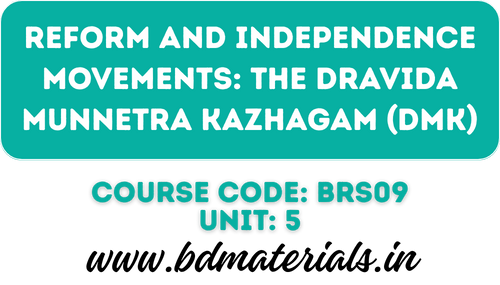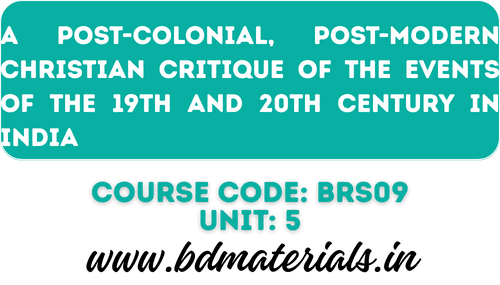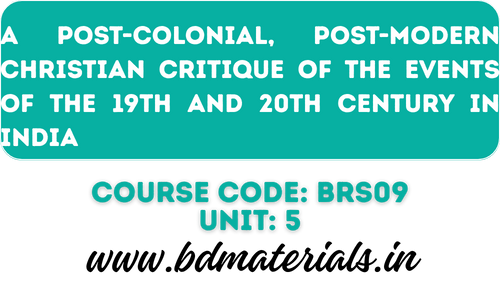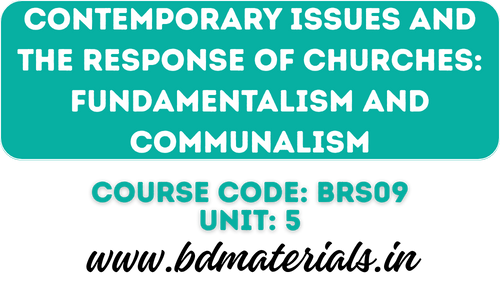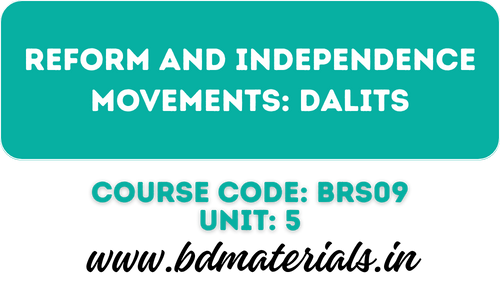Reform and Independence Movements: The Dravida Munnetra Kazhagam (DMK)
It is also one of the secular and political ideologies of India. The DMK is an off-shoot of Dravida Kazhagam which was started by Mr. E.V. Ramaswami Nayakar in 1944 emphasizing the Dravidian tradition of the Tamilnadu. Originating from a stout opposition of the evils of Brahninical Hinduism and discrimination of the non-Brahmins as against the Brahmins, the Dravida Kazhagam sprang forth as a self-respect movement. In course of time it made a demand for Dravida State which was ignored by the British. Mr. C.N. Annadurai broke away from the Kazhagam because of its anti-national attitude (to boycott the national Independence celebration etc), and formed the Dravida Munnetra Kazhagam in September 17th, 1949.
The DMK continued its activities in the form of a revolt against religion. The approach of DMK to religion was rationalistic. The movement was greatly influenced by Robert Ingersoll, the rationalist. As Mr. Annadurai followed Ingersoll’s philosophy he was known as “Thennattu Ingersoll”. DMK condemned Hindu religious scriptures, especially, Veda, Purnas and Manudharam Sastra where in the Brahmin has been given a supreme position. It condemned religious festivals also. A suggestion was made that the temples should be converted into educational centres. Religious superstations were condemned.
Then DMK conducted programmes of social reform. They abandoned the practice of attaching caste fills to names, castes, distinction and caste marks worn on the forehead were condemned. The Brahmins were also asked to drop their caste distinctions. A state wide effort was made to wipe out the name Brahmin from the sign boards of Brahmin Hotels and Coffee houses. Inter-caste marriages were encouraged and in most cases group marriages were celebrated to bring down the expenses. Remarriage of widows was encouraged and dowry system was derided. Equality between sexes was promoted.
Arising from the promotion of Tamil culture, a Tamil Nationalist Party was stated in 1961 by Mr. E.V.K. Sampth, one of the leaders of the DMK. From this time onwards, the party made demands for Tamil National self-Government. It was at this time that the Kazagam assumed a national role and established a party in their fight for power. Mr. Karunanidhi is the present President of DMK. The present ruling party of Tamilnadu namely All India Anna DMK (AIDMK OR ADMK) was divided from DMK during the time of M.G. Ramachandran. DMK always supported secularism in India but it is antagonistic to religion in its very nature. Its part and participation in Indian Nationalistic movements was very little but it was considered as a secular ideology in Tamil Nationalism. Its social reformative movements also promoted secular spirit in Indian Nationalism, especially in Tamil speaking area.
These three INC, CPI and DMK are the main secular and political idiocies in the context of nationalistic movements of India. Some social reformative movements also played the role as secular ideologies especially in the context of Indian nationalism. During 1870’s and 1880’s the religious, social and political reform began to combine into organizing movements with the spirit of nationalism, Nationalists were religious and also social reformers, political agitators, poets and statesmen. Some secular ideologies connected with the religion i.e., the Muslim league, Rashtriya Swayam Sevak Sangh (RSS), Jamait-e-Islami Hind, Sarvodya and Bhoodan Movements etc., are closely connected with religion even though sometimes they follow secularism so these ideologies are categories as Religious-cum-Secular Ideologies. Particularly some religious movements such as Brahmo Samaj, Arya Samaj, Theosophical Society, Ramakrishna Mission etc. emphasised the religious ideologies in Indian Nationalistic Movements. These are not considered as secular ideologies.
CONCLUSION AND EVALUATION:
Wise statesmanship and certain facts of national existence enable India to accept the idea of the secular state. The Dynamic secularism of India is described in four points:
- The State accepts no established religion. It may be added that no Article forbidding the establishments of a State religion, similar to the provision in the US Constitution.
- Equality of treatment for all religions is guaranteed the state being forbidden to show any preferential treatment of any particular religion. The State is forbidden from compulsory taxation of citizens for the maintenance or promotion of any particular religion and form providing religious instruction in any educational institution run by the State.
- The State assures absolute freedom of belief for every citizen.
- The State guarantees all citizens freedom to express their beliefs by over acts and to propagate such beliefs, and every religious denomination has the right to manage its own religious affairs without interference and establish institutions for religious and charitable purposes.
This is the basic secular ideology of Indian state. Indian National Congress with a secular ideology tried its level best to protect the unity and integrity of our nation. Especially its participation in Indian nationalistic movements was remarkable. Since the beginning of the 20th century onwards INC became a main political and secular party of India especially since 1947 it has been playing an important role to promote and defend secularism in India. From time to time the religious parties such as Baratiya Janata Party, Rashtriya Swayam Sevak Sangh, Vishwa Hindu Parishad, Shiv Sena, Muslim League etc., have been creating problems to Indian secularism, but Indian National Congress faced all the challenges and restored these secular status in India. We knew very well that the right part of the BJP, RSS, VHP and Shiv Sena in the demolition of historical Babri Masjid on Dec. 6th 1992 at Ayodhya and their active part in following violence especially
Friendly Note
Bachelor of Divinity Materials is your go-to resource for comprehensive Biblical studies, supporting students in Bachelor of Divinity (B.D.) and other theological courses. Our platform offers access to the full syllabus, detailed answers, and a vast collection of assignments, study guides, articles, and research papers to help you excel academically.
We provide downloadable PDFs of study materials, including books and journals, for convenient learning anytime, anywhere. Whether preparing for exams or conducting research, our resources cater to both students and scholars in biblical studies.
Committed to empowering theological learners, we aim to deliver high-quality, authentic study materials. Explore Bachelor of Divinity Materials to deepen your understanding of God’s Word and Christian doctrine, making it a valuable resource for aspiring ministers and anyone dedicated to theology.
